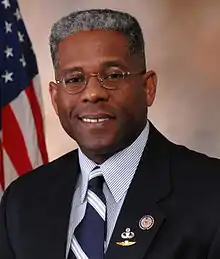Republican Party of Texas
The Republican Party of Texas (RPT) is the affiliate of the United States Republican Party in the state of Texas. It is chaired by Allen West and vice chaired by Cat Parks. It is headquartered in Austin. The RPT is legally considered to be a political action committee.
Republican Party of Texas | |
|---|---|
 | |
| Chairman | Allen West |
| Governor of Texas | Greg Abbott |
| Lieutenant Governor of Texas/President of the Senate | Dan Patrick |
| Speaker of the House | Dade Phelan |
| Founded | 1867 |
| Headquarters | PO Box 2206 Austin, Texas 78768 |
| Ideology | Conservatism Fiscal conservatism Social conservatism Trumpism Factions: Texan secessionism[1][2] |
| Political position | Right-wing to far-right |
| National affiliation | Republican Party |
| Colors | Red |
| Slogan | We are the storm[3] |
| Texas House of Representatives | 83 / 150
|
| Texas Senate | 18 / 31
|
| Statewide Executive Offices | 9 / 9
|
| U.S. House of Representatives | 22 / 36
|
| U.S. Senate | 2 / 2
|
| Website | |
| www.texasgop.org/ | |
History
.jpg.webp)

The Republican Party developed dramatically in Texas during Reconstruction after constitutional amendments freeing the slaves and giving suffrage to black males, as blacks joined the party that had ensured the end of slavery. African-American leaders, frequently men of mixed race who had been free and educated before the war, provided leadership in extending education and work opportunities to blacks after the war. They supported establishment of a public school system for the first time. Men such as William Madison McDonald in Fort Worth, Norris Wright Cuney in Galveston, and Henry Clay Ferguson worked for the black community and the state.
In 1870, Edmund Davis was elected Governor, but was soundly defeated in 1874. In the year 1876, Republicans had made gradual gains in Texas, earning nearly one-third of the statewide vote and electing a small number of candidates to the State Legislature (including several African Americans).
After the Reconstruction era, the Republican Party of Texas gradually lost power, and after the turn of the century, the "Lily Whites" pushed blacks out of power. The Democrats passed disfranchising laws near the turn of the century requiring poll taxes be paid prior to voter registration; together with the party establishing white primaries, black voting dropped dramatically, from more than 100,000 statewide in the 1890s, to 5,000 in 1906.[4] Mexican Americans and poor whites were also adversely affected by such measures. For more than 100 years, the Republicans were a minority party in the state. As a result, the biggest base of electoral support for the Republican Party in Texas during this time was the German Texan community in the Texas Hill Country, with the majority-German Gillespie, Guadalupe and Kendall counties constituting the most Republican counties in the state of Texas throughout the late 19th and into the 20th century.
Between the departing of Robert B. Hawley from his second U.S. House term in 1901 and the seating of Bruce Alger in 1954, the sole Republican to represent Texas in Congress was Harry M. Wurzbach, a politician from the German Texan community in the Hill Country who served in the U.S. House for most of the 1920s and left office in 1931.[5] The first Republican statewide primary was held in 1926, but drew only 15,239 voters. By contrast, the Democratic primary in the same year drew 821,234 voters, as disfranchisement was well established, and Texas was essentially a one-party, white-only voting state. Only two more Republican primaries were run in the next thirty-four years.[6]
1960–present
In 1961, James A. Leonard became the first executive director of the organization. He is credited as the "architect" of John Tower's successful campaign to fill Lyndon Johnson's vacant U.S. Senate seat, a victory that was a breakthrough in the party's attempts to gain a foothold in Texas politics.[7]
In 1966, two Republicans were elected to the U.S. House of Representatives, including future President George H.W. Bush, for the first time since Reconstruction. That same year, three Republicans were elected to the Texas House of Representatives, and the first Republican was elected to the Texas Senate in 39 years. By 1972, Texas Republicans had increased their gains to 17 members of the Texas House and 3 members of the Texas Senate.[6]
The true turning point for Texas Republicans occurred in the May 1976 primary, when Ronald Reagan defeated Gerald Ford by a two-to-one margin in the state's presidential primary. According to former Secretary of State James A. Baker III, due to Reagan's victory in the Texas primary, "the whole shape and nature of the state changed."[8]
104 years after the most recent previous Republican governor, Bill Clements eked out a narrow victory in November 1978. In 1984, Reagan, George H.W. Bush, and Phil Gramm led a GOP ticket that relied upon the RPT to provide a centralized network of communications. Throughout the rest of the decade, the total Republican vote continued to increase, and the party made large gains in both the state legislature and in local races.[6]
Since 1994, every statewide elected office has been held by a Republican. Both houses of the Texas Legislature feature Republican majorities. The last time Texas was carried by a Democratic presidential candidate was in 1976, when the state voted for Jimmy Carter.
George H.W. Bush (41st) and his son George W. Bush (43rd) are the only Republican Presidents from Texas.
Current elected officials
Texas Republicans currently control all elected statewide offices, a majority in the Texas Senate, and a majority in the Texas House of Representatives. Republicans also hold both of the state's U.S. Senate seats and 23 of the state's 36 U.S. House seats.
U.S. Senate
Republicans have controlled both of Texas's seats in the U.S. Senate since 1993:
- Class I: Ted Cruz (Junior Senator)
.jpg.webp) Junior Senator Cruz
Junior Senator Cruz - Class II: John Cornyn (Senior Senator, Chair of Senate Narcotics Caucus)
.jpg.webp) Senior Senator Cornyn
Senior Senator Cornyn

U.S. House of Representatives
Out of the 36 seats Texas is apportioned in the U.S. House of Representatives, 22 are currently held by Republicans, making it the largest Republican delegation in the U.S. House:
- TX-01: Louie Gohmert
- TX-02: Dan Crenshaw
- TX-03: Van Taylor
- TX-04: Pat Fallon
- TX-05: Lance Gooden
- TX-08: Kevin Brady
- TX-10: Michael McCaul
- TX-11: August Pfluger
- TX-12: Kay Granger
- TX-13: Ronny Jackson
- TX-14: Randy Weber
- TX-17: Pete Sessions
- TX-19: Jodey Arrington
- TX-21: Chip Roy
- TX-22: Troy Nehls
- TX-23: Tony Gonzales
- TX-24: Beth Van Duyne
- TX-25: Roger Williams
- TX-26: Michael C. Burgess
- TX-27: Michael Cloud
- TX-31: John Carter
- TX-36: Brian Babin
Statewide officials
Republicans control all nine of the elected statewide offices:
- Governor: Greg Abbott
- Lieutenant Governor: Dan Patrick
- Attorney General: Ken Paxton
- Comptroller of Public Accounts: Glenn Hegar
- State Land Commissioner: George P. Bush
- State Agriculture Commissioner: Sid Miller
- Railroad Commission Chairman: Ryan Sitton
- Railroad Commissioner: Wayne Christian
- Railroad Commissioner: Christi Craddick
State legislative leaders
- President of the Senate: Dan Patrick
- Speaker of the House: Dade Phelan
State Republican Executive Committee Members
Biannually, in even-numbered years, delegates at the Texas GOP State Convention elect a man and a woman from each of the thirty-one State Senatorial districts to serve a two-year term on the State Republican Executive Committee (SREC). The State Republican Executive Committee along with the elected State Chair and State Vice Chair manage the affairs of the Republican Party of Texas between state conventions.[9]
List of state party chairs
- Orville Bullington (1951–1952)
- Thad Hutcheson (1958)
- State Party Chairmen since 1962
- Peter O'Donnell (1962–1969)
- William Steger (1969–1971)
- Missing (1971–1976)
- Ray Hutchison – (1976–1977)
- Ray Barnhart – (1977–1979)
- Chet Upham – (1979–1983)
- George Strake, Jr. – (1983–1988)
- Fred Meyer – (1988–1994)
- Tom Pauken – (1994–1997)
- Susan Weddington – (1997–2003)
- Tina Benkiser – (2003–2009)
- Cathie Adams – (2009–2010)
- Steve Munisteri – (2010–2015)
- Tom Mechler – (2015–2017)
- James Dickey – (2017 – 2020)
- Allen West – (2020 – present)
Auxiliary organizations
The party has a number of affiliates and auxiliary organizations, including the Texas Federation of College Republicans,[10] High School Republicans of Texas,[11] Texas Federation of Republican Women (TFRW),[12] Texas Republican County Chairmen's Association,[13] Texas Young Republican Federation (TYRF),[14] Texas Federation for Republican Outreach,[15] Texas Republican Assembly,[16] and Texas Federation of Hispanic Republicans.[17]
References
- "The Texas GOP had a fit after the Supreme Court rejected their bid to flip the election in Trump's favor, and now they're hinting at secession". Business Insider. December 11, 2020. Retrieved December 12, 2020.
- "Texas GOP chair floats secession for 'law-abiding states' after Supreme Court defeat". The Hill. December 11, 2020. Retrieved December 12, 2020.
- ""We are the storm": Texas GOP condemned for keeping "QAnon slogan" after Capitol attack". Newsweek. January 25, 2021.
- African-American Pioneers of Texas: From the Old West to the New Frontiers (Teacher's Manual) (PDF). Museum of Texas Tech University: Education Division. p. 25. Archived from the original (PDF) on February 5, 2007.
- Wurzbach's election and re-election as a Republican were something of an anomaly. He is the eponym honored in the Wurzbach Parkway in San Antonio.
- "History of the Republican Party of Texas". texasgop.org. Archived from the original on April 22, 2011. Retrieved April 26, 2011.
- Republican strategist Leonard helped mold GOP in Texas (Austin American Statesman)
- "Ronald Reagan: How he changed Texas Politics Forever". chron.com. Retrieved February 6, 2011.
- "State Republican Executive Committee – Republican Party of Texas". Republican Party of Texas. Retrieved May 25, 2018.
- "Texas College Republicans – The Official Home of the Texas College Republicans". txcollegerepublicans.com. Retrieved April 26, 2011.
- "Auxiliaries & Coalitions Organizations – Republican Party of Texas". Republican Party of Texas. Retrieved May 25, 2018.
- "TFRW Home Page". tfrw.org. Retrieved April 26, 2011.
- "Texas Republican County Chairmans Association". trcca.org. Archived from the original on August 18, 2010. Retrieved April 26, 2011.
- "Texas Young Republican Federation". texasyoungrepublicans.com. Retrieved April 26, 2011.
- "About Us – Texas Federation for Republican Outreach". txfro.org. Archived from the original on May 6, 2011. Retrieved April 26, 2011.
- "Texas Republican Assembly – The Republican Wing of the Republican Party". texasra.org. Retrieved April 26, 2011.
- "Welcome to the Latino National Republican Coalition of Texas". lnrctexas.org. Archived from the original on October 29, 2011. Retrieved April 26, 2011.
